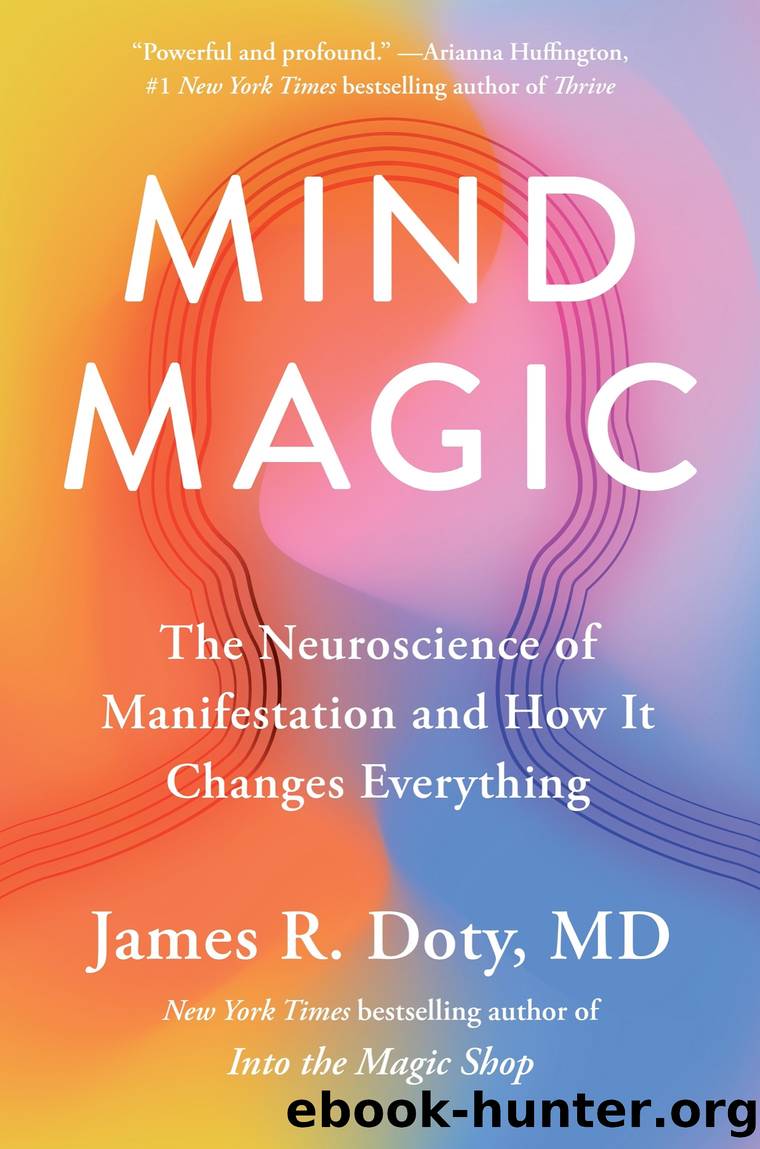Mind Magic by James R. Doty MD

Author:James R. Doty, MD [Doty, James R.]
Language: eng
Format: epub
Publisher: Penguin Publishing Group
Published: 2024-05-07T00:00:00+00:00
THE MISERLY BRAIN
Thereâs a maxim that is often repeated among entrepreneurs: People do business with people they know, like, and trust. This is true for small-business owners and the ambitious entrepreneurs and CEOs of huge companies, but it is also true of the brain.
The brain is constantly blocking stimuli and deliberately filtering out most of our experiences. Like a homebody set in their ways who groans and digs in on the sofa instead of going to the party, the brain resists new experiences that might force it to alter its complex circuitry that has served a purpose, be it healthy or not, over time. The reason for this is that the human brain is designed to be extremely conscientious about its energy use.
For all the thinking power, vision, and abstract reasoning the brain provides us with, it is an energy guzzler. The adult human brain represents about 2 percent of our body weight but, remarkably, accounts for about 20 percent of the oxygen consumed, and therefore the caloriesâsignificantly more than any other organ. Within the gray tissue crisscrossed with spongy coils there are over one hundred billion cells, and each of them makes over ten thousand connections within the vast network woven between brain cells. This web produces a thousand trillion synaptic connections, greater in number even than the stars in the universe. About two-thirds of the brainâs energy budget goes to helping neurons send signals to each other, and the last third goes to âhousekeeping,â or cell-health maintenance.
The brainâs miserliness is rooted in our evolution as a species. The high energy cost of the brainâs labor to form cell connections in service of higher-order processes presented a major problem for our biological predecessors. For the brain to stay âsolventâ with such a large energy budget, our ancestors on the savanna had to provide it with vast amounts of fuel. There is even some speculation that the invention of cooked food, especially cooked meat, is directly tied to our ancestorsâ need for the vast number of calories required to develop brains of such complexity.
But given the tremendous labor required to capture and kill animals, the brain had to significantly streamline its working process. Our brains have no way of storing surplus energy the way our muscles can take on fat. So when our brains need energy, they must draw on a quick-release fuel source: our blood sugar. Any extra work the brain must do pulls on our glucose levels, which is like the premium unleaded gasoline of the body. Such precious fuel is in short supply, and the body relinquishes it only sparingly.
With this evolutionary inheritance, the brain is trying to conserve energy in any way possible, and it does so in a variety of ways. Have you ever noticed you canât remember the name of the plucky kid from your favorite show in childhood? Thatâs because the brain developed not just learning mechanisms but also forgetting mechanisms that erase information it believes has become unnecessary because we have stopped recalling it.
Download
This site does not store any files on its server. We only index and link to content provided by other sites. Please contact the content providers to delete copyright contents if any and email us, we'll remove relevant links or contents immediately.
| Acupuncture & Acupressure | Aromatherapy |
| Ayurveda | Chelation |
| Chinese Medicine | Energy Healing |
| Healing | Herbal Remedies |
| Holistic | Homeopathy |
| Hypnotherapy | Massage |
| Meditation | Naturopathy |
| Reference |
Inner Engineering: A Yogi's Guide to Joy by Sadhguru(5948)
The Power of Now: A Guide to Spiritual Enlightenment by Eckhart Tolle(4806)
Fear by Osho(4120)
The Art of Happiness by The Dalai Lama(3422)
The Ultimate Bodybuilding Cookbook by Kendall Lou Schmidt(3362)
Yoga Therapy by Mark Stephens(3250)
Ikigai by Héctor García & Francesc Miralles(3217)
The Little Book of Hygge by Meik Wiking(3111)
Why Buddhism is True by Robert Wright(2864)
The Healing Self by Deepak Chopra(2827)
Being Aware of Being Aware by Rupert Spira(2734)
Shift into Freedom by Loch Kelly(2714)
Wild Words from Wild Women by Stephens Autumn(2619)
Work Clean by Dan Charnas(2584)
Happiness by Matthieu Ricard(2551)
The Hatha Yoga Pradipika (Translated) by Svatmarama(2535)
Yoga Body & Mind Handbook by Jasmine Tarkeshi(2480)
More Language of Letting Go: 366 New Daily Meditations by Melody Beattie(2475)
Why I Am Not a Feminist by Jessa Crispin(2270)
